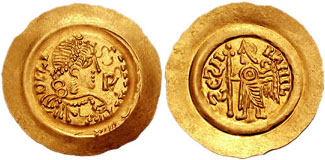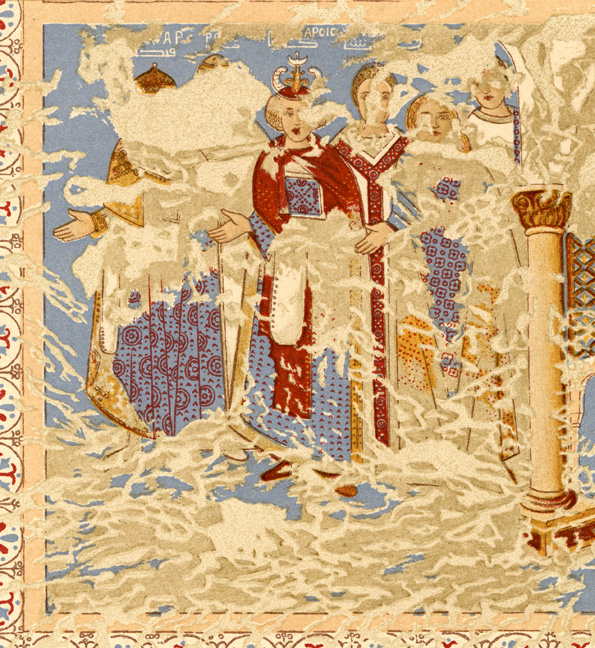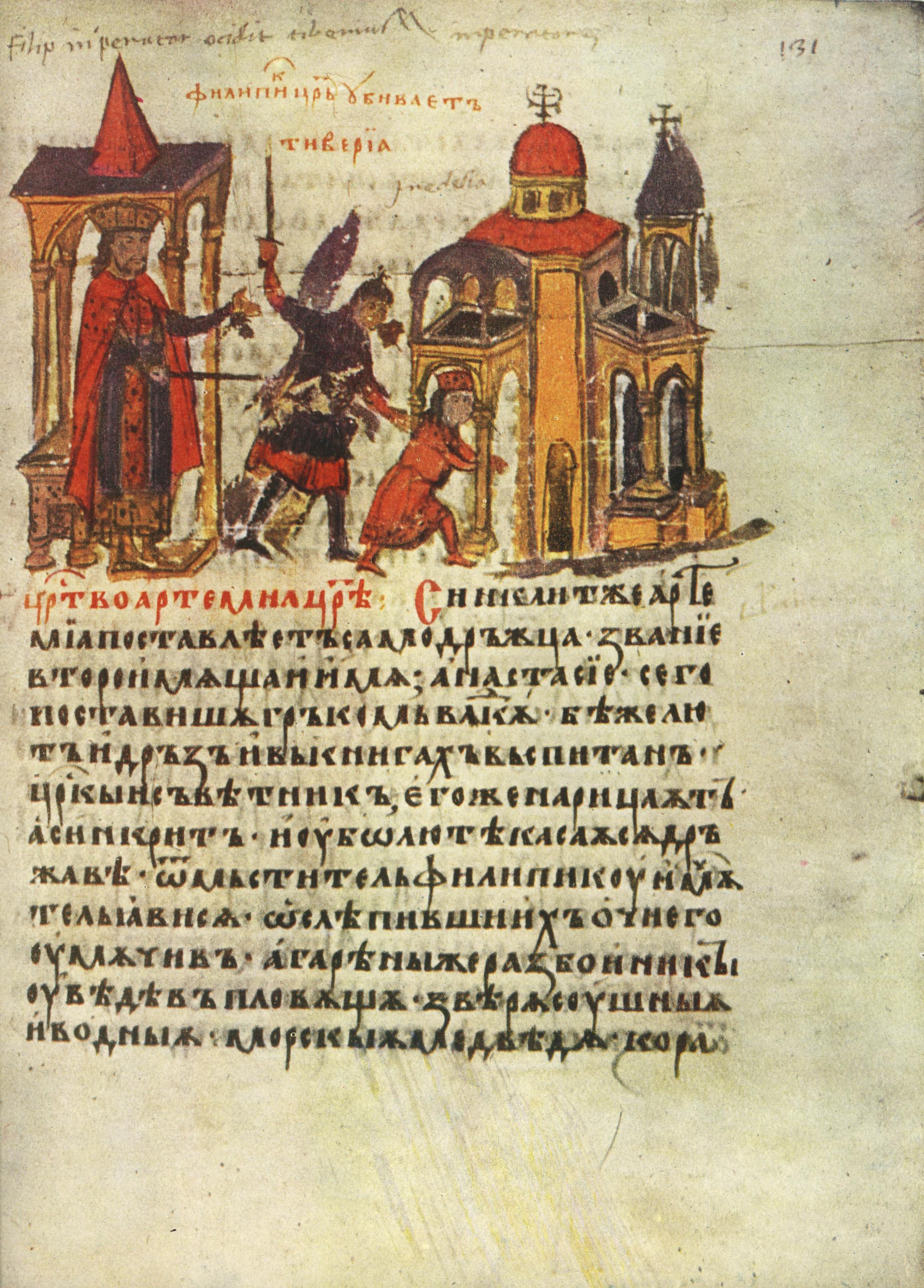|
712
__NOTOC__ Year 712 ( DCCXII) was a leap year starting on Friday of the Julian calendar, the 712th year of the Common Era (CE) and Anno Domini (AD) designations, the 712th year of the 1st millennium, the 12th year of the 8th century, and the 3rd year of the 710s decade. The denomination 712 for this year has been used since the early medieval period, when the Anno Domini calendar era became the prevalent method in Europe for naming years. Events By place Byzantine Empire * The Bulgars under Tervel, ruler (''khagan'') of the Bulgarian Empire, raid Thrace and reach the city walls of Constantinople. Skirmishes continue until 716; Emperor Philippicus transfers a Byzantine army from the Opsikion Theme in Asia Minor, to police the Balkan Peninsula. Europe * February – King Ansprand dies, and is succeeded by his son Liutprand as ruler of the Lombards. During his reign, Liutprand becomes the greatest of the Lombard Kings. Coins and documents from his court at Pav ... [...More Info...] [...Related Items...] OR: [Wikipedia] [Google] [Baidu] |
List Of Kings Of The Lombards
The kings of the Lombards or ''reges Langobardorum'' (singular ''rex Langobardorum'') were the monarchs of the Lombard people from the early 6th century until the Lombardic identity became lost in the 9th and 10th centuries. After 774, the kings were not Lombards, but Franks. From the 12th century, the votive crown and reliquary known as the Iron Crown (''Corona Ferrea'') retrospectively became a symbol of their rule, though it was never used by Lombard kings. The primary sources for the Lombard kings before the Frankish conquest are the anonymous 7th-century '' Origo Gentis Langobardorum'' and the 8th-century ''Historia Langobardorum'' of Paul the Deacon. The earliest kings (the pre-Lethings) listed in the ''Origo'' are almost certainly legendary. They purportedly reigned during the Migration Period. The first ruler attested independently of Lombard tradition is Tato. Early rulers Legendary rulers * Shava *Ybor and Agio, brothers, together with their mother Gambara, who led ... [...More Info...] [...Related Items...] OR: [Wikipedia] [Google] [Baidu] |
Balkans
The Balkans ( , ), corresponding partially with the Balkan Peninsula, is a geographical area in southeastern Europe with various geographical and historical definitions. The region takes its name from the Balkan Mountains that stretch throughout the whole of Bulgaria. The Balkan Peninsula is bordered by the Adriatic Sea in the northwest, the Ionian Sea in the southwest, the Aegean Sea in the south, the Turkish straits in the east, and the Black Sea in the northeast. The northern border of the peninsula is variously defined. The highest point of the Balkans is Musala, , in the Rila mountain range, Bulgaria. The concept of the Balkan Peninsula was created by the German geographer August Zeune in 1808, who mistakenly considered the Balkan Mountains the dominant mountain system of southeastern Europe spanning from the Adriatic Sea to the Black Sea. In the 19th century the term ''Balkan Peninsula'' was a synonym for Rumelia, the parts of Europe that were provinces of the Ottoman E ... [...More Info...] [...Related Items...] OR: [Wikipedia] [Google] [Baidu] |
8th Century
The 8th century is the period from 701 (represented by the Roman numerals DCCI) through 800 (DCCC) in accordance with the Julian Calendar. In the historiography of Europe the phrase the long 8th century is sometimes used to refer to the period of circa AD 660–820. The coast of North Africa and the Iberian Peninsula quickly came under Islamic Arab domination. The westward expansion of the Umayyad Empire was famously halted at the siege of Constantinople by the Byzantine Empire and the Battle of Tours by the Franks. The tide of Arab conquest came to an end in the middle of the 8th century.Roberts, J., '' History of the World'', Penguin, 1994. In Europe, late in the century, the Vikings, seafaring peoples from Scandinavia, begin raiding the coasts of Europe and the Mediterranean, and go on to found several important kingdoms. In Asia, the Pala Empire is founded in Bengal. The Tang dynasty reaches its pinnacle under Chinese Emperor Xuanzong. The Nara period begins in ... [...More Info...] [...Related Items...] OR: [Wikipedia] [Google] [Baidu] |
Liutprand, King Of The Lombards
Liutprand was the List of kings of the Lombards, king of the Lombards from 712 to 744 and is chiefly remembered for his multiple phases of law-giving, in fifteen separate sessions from 713 to 735 inclusive, and his long reign, which brought him into a series of conflicts, mostly successful, with most of Italian peninsula, Italy. He is often regarded as the most successful Lombard monarch, notable for the Donation of Sutri in 728, which was the first accolade of sovereign territory to the Papacy. Early life Liutprand's life began inauspiciously. His father was driven to exile among the Bavarians, his older brother Sigipert was blinded by Aripert II, king of the Lombards, and his mother Theodarada and sister Aurona were mutilated (their noses and ears were cut off). Liutprand was spared only because his youth made him appear harmless, described as adolescens in Paul the Deacon's ''Historia Langobardorum'' (Book VI, xxii), suggesting that he was 'probably older than 19 but still in h ... [...More Info...] [...Related Items...] OR: [Wikipedia] [Google] [Baidu] |
Ansprand
Ansprand ( 657 – 712) was king of the Lombards briefly in 712. Before that, he was the duke of Asti and regent during the minority of Liutpert (700–701). He was defeated at Novara by Raginpert and exiled during the subsequent war over the succession, fleeing to the court of Theudebert, duke of Bavaria, in 702. In 711, he returned with a large army from the duke. Many Austrians (the men of Venetia and the east) joined the returning regent and battle ensued near Pavia Pavia ( , ; ; ; ; ) is a town and comune of south-western Lombardy, in Northern Italy, south of Milan on the lower Ticino (river), Ticino near its confluence with the Po (river), Po. It has a population of c. 73,086. The city was a major polit ..., between his forces and those of King Aripert II, who had usurped the throne. Aripert fled to his capital when the tide went against him, but he hoarded the treasures and tried to cross over into Gaul by night. He drowned in the Ticino River and Ansprand was ... [...More Info...] [...Related Items...] OR: [Wikipedia] [Google] [Baidu] |
Umayyad Conquest Of Hispania
The Muslim conquest of the Iberian Peninsula (; 711–720s), also known as the Arab conquest of Spain, was the Umayyad Caliphate, Umayyad conquest of the Visigothic Kingdom, Visigothic Kingdom of Hispania in the early 8th century. The conquest resulted in the end of Christianity, Christian rule in most of Iberia and the establishment of Muslims, Muslim Arab world, Arab-Moors, Moorish rule in that territory, which came to be known as al-Andalus, under the Umayyad dynasty. During the caliphate of the sixth Umayyad caliph al-Walid I (), military commander Tariq ibn Ziyad departed from North Africa in early 711 to cross the Straits of Gibraltar, with a force of about 1,700 men, to launch a military expedition against the Visigothic Kingdom, Visigoth-controlled Kingdom of Toledo, Spain, Toledo, which encompassed the former territory of Roman Hispania. After defeating king Roderic at the Battle of Guadalete in July the same year, Tariq was reinforced by an Arabs, Arab force led by his s ... [...More Info...] [...Related Items...] OR: [Wikipedia] [Google] [Baidu] |
Pavia
Pavia ( , ; ; ; ; ) is a town and comune of south-western Lombardy, in Northern Italy, south of Milan on the lower Ticino (river), Ticino near its confluence with the Po (river), Po. It has a population of c. 73,086. The city was a major political centre in the medieval period, being the capital of the Ostrogothic Kingdom from 540 to 553, of the Kingdom of the Lombards from 572 to 774, of the Kingdom of Italy (Holy Roman Empire), Kingdom of Italy from 774 to 1024 and seat of the Visconti of Milan, Visconti court from 1365 to 1413. Pavia is the capital of the fertile province of Pavia, which is known for a variety of agricultural products, including wine, rice, cereals, and dairy products. Although there are a number of industries located in the suburbs, these tend not to disturb the peaceful atmosphere of the town. It is home to the ancient University of Pavia (founded in 1361 and recognized in 2022 by the Times Higher Education World University Rankings, Times Higher Education ... [...More Info...] [...Related Items...] OR: [Wikipedia] [Google] [Baidu] |
Constantinople
Constantinople (#Names of Constantinople, see other names) was a historical city located on the Bosporus that served as the capital of the Roman Empire, Roman, Byzantine Empire, Byzantine, Latin Empire, Latin, and Ottoman Empire, Ottoman empires between its consecration in 330 until 1930, when it was renamed to Istanbul. Initially as New Rome, Constantinople was founded in 324 during the reign of Constantine the Great on the site of the existing settlement of Byzantium, and shortly thereafter in 330 became the capital of the Roman Empire. Following the collapse of the Western Roman Empire in the late 5th century, Constantinople remained the capital of the Eastern Roman Empire (also known as the Byzantine Empire; 330–1204 and 1261–1453), the Latin Empire (1204–1261), and the Ottoman Empire (1453–1922). Following the Turkish War of Independence, the Turkish capital then moved to Ankara. Although the city had been known as Istanbul since 1453, it was officially renamed as Is ... [...More Info...] [...Related Items...] OR: [Wikipedia] [Google] [Baidu] |
Lombards
The Lombards () or Longobards () were a Germanic peoples, Germanic people who conquered most of the Italian Peninsula between 568 and 774. The medieval Lombard historian Paul the Deacon wrote in the ''History of the Lombards'' (written between 787 and 796) that the Lombards descended from a small tribe called the Winnili,: "From Proto-Germanic language, Proto-Germanic ''wikt:Reconstruction:Proto-Germanic/winnaną, winna-'', meaning "to fight, win" who dwelt in northern Germany before migrating to seek new lands. Earlier Roman-era historians wrote of the Lombards in the first century AD as being one of the Suebian peoples, also from what is now northern Germany, near the Elbe river. They migrated south, and by the end of the fifth century, the Lombards had moved into the area roughly coinciding with modern Austria and Slovakia north of the Danube. Here they subdued the Heruls and later fought frequent wars with the Gepids. The Lombard king Audoin defeated the Gepid leader Thuris ... [...More Info...] [...Related Items...] OR: [Wikipedia] [Google] [Baidu] |
Philippikos Bardanes
Philippicus (; ), born Bardanes (; ) was Byzantine emperor from 711 to 713. He took power in a coup against the unpopular emperor Justinian II, and was deposed in a similarly violent manner nineteen months later. During his brief reign, Philippicus supported monothelitism in Byzantine theological disputes, and saw conflict with the First Bulgarian Empire and the Umayyad Caliphate. Biography Philippicus was originally named Bardanes (; ); he was the son of the patrician Nicephorus, who was of Armenian extraction from an Armenian colony in Pergamum. The Armenian background of Philippicus has been supported by Byzantinist historians Peter Charanis and Nicholas Adontz, and disputed by Anthony Kaldellis. Kaldellis adds that Bardanes was probably born and raised in the Byzantine realm, as his father Nicephorus possibly was. Contemporaneous sources attest to Bardanes' tutoring, scholarly interests, learning and eloquence, all of which were in Greek. Byzantine historians Leslie B ... [...More Info...] [...Related Items...] OR: [Wikipedia] [Google] [Baidu] |
Roman Numerals
Roman numerals are a numeral system that originated in ancient Rome and remained the usual way of writing numbers throughout Europe well into the Late Middle Ages. Numbers are written with combinations of letters from the Latin alphabet, each with a fixed integer value. The modern style uses only these seven: The use of Roman numerals continued long after the Fall of the Western Roman Empire, decline of the Roman Empire. From the 14th century on, Roman numerals began to be replaced by Arabic numerals; however, this process was gradual, and the use of Roman numerals persisted in various places, including on clock face, clock faces. For instance, on the clock of Big Ben (designed in 1852), the hours from 1 to 12 are written as: The notations and can be read as "one less than five" (4) and "one less than ten" (9), although there is a tradition favouring the representation of "4" as "" on Roman numeral clocks. Other common uses include year numbers on monuments and buildin ... [...More Info...] [...Related Items...] OR: [Wikipedia] [Google] [Baidu] |
North Africa
North Africa (sometimes Northern Africa) is a region encompassing the northern portion of the African continent. There is no singularly accepted scope for the region. However, it is sometimes defined as stretching from the Atlantic shores of the Western Sahara in the west, to Egypt and Sudan's Red Sea coast in the east. The most common definition for the region's boundaries includes Algeria, Egypt, Libya, Morocco, Tunisia, and Western Sahara, the territory territorial dispute, disputed between Morocco and the list of states with limited recognition, partially recognized Sahrawi Arab Democratic Republic. The United Nations’ definition includes all these countries as well as Sudan. The African Union defines the region similarly, only differing from the UN in excluding the Sudan and including Mauritania. The Sahel, south of the Sahara, Sahara Desert, can be considered as the southern boundary of North Africa. North Africa includes the Spanish cities of Ceuta and Melilla, and the ... [...More Info...] [...Related Items...] OR: [Wikipedia] [Google] [Baidu] |









